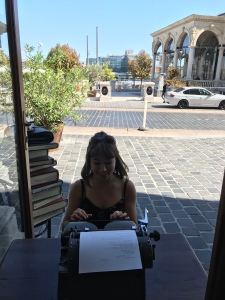Turbulent, passionate, emotive, beautiful, evocative, heart-breaking, gasp-, awe-, tear-inducing. A classic Hardy.
Review done. In all seriousness, there’s little more that I want to or can say about this book. Because, however hard I try, there is no way that I’ll be able to give a true representation of this undulating and sensitive masterpiece in a spoiler-less and relatively short review. And my powers of expression seem pretty piddly in comparison to Hardy’s mastery of the English language.
But I’ll give it a go, in the hope that you’ll agree that this not a book which one regrets reading.
The title, which I’ve seen pretty accurately described as ‘lugubrious’ (looking or sounding sad and dismal), is intriguing, with its sole focus upon one character, in line with the tradition of tragedy which saw Hamlet named after its eponymous Danish prince. And yet for the majority of the novel, Jude certainly does not find himself alone – which makes Hardy’s change from some of his working titles, ‘The Simpletons’, ‘Hearts Insurgent’ and ‘The Recalcitrants’ especially intriguing. Similarly, his early revision of the protagonist’s name from ‘Jack’ to ‘Jude’ – Hardy wanted us to focus on this character, and to recognise that he’s not just your average Joe (or Jack, for that matter).
And I think we do recognise this. Jude and Sue are aeons ahead of their time, which both Hardy and Jude regret with Jude’s despondent lamentation: ‘Our ideas were fifty years too soon to be any good to us.’ And, as with Jude’s hopelessly forward-thinking views on love, marriage and ambition, he is pitifully misunderstood in general, which Hardy makes clear so eloquently to the reader even before his character’s resignation has descended: ‘The deadly animosity of contemporary logic and vision towards so much of what he held in reverence was not yet revealed to him’. Any lover of literature which came from the pre-social media age might easily sympathise with Jude’s disparaged appreciation of a beloved past.
Please don’t read past this point if you haven’t read the book, and intend to. (Which you should.)
Jude is a lover and reverer of the antiquated. He is a living contradiction, combining innovative, progressive values with intensely old-fashioned interests. Hardy gives us an enigma, a lone wolf, a tragic hero. But the novel starts and ends, not with Jude alone, or even Jude himself. The introduction of his schoolmaster, the inspiration of his academic aspirations, predates his own, and, crucially, it is Sue who is lingering in our minds when we well up at the picture of Jude’s final peace. However ‘obscure’ Hardy wants his unfortunate but powerfully endearing hero to be – however lonely his eventual end – it’s impossible for him to succeed in convincing us that tragically admirable Jude hasn’t left a large hole in at least one heart other than our own. We see that, however unhappy, however deserted Jude is, however frequently and ruinously his ideas and ambitions fail, it isn’t these events and disappointments towards which Hardy is really drawing our attention, but instead how the current of his unassuming, kind and endlessly loveable character ripples through the little world which he leaves behind. And it is little – it may only consist of the reader, Sue, and perhaps dear old Widow Edlin – but the impact of poor Jude’s final demise upon it, on the contrary, is profoundly large.
